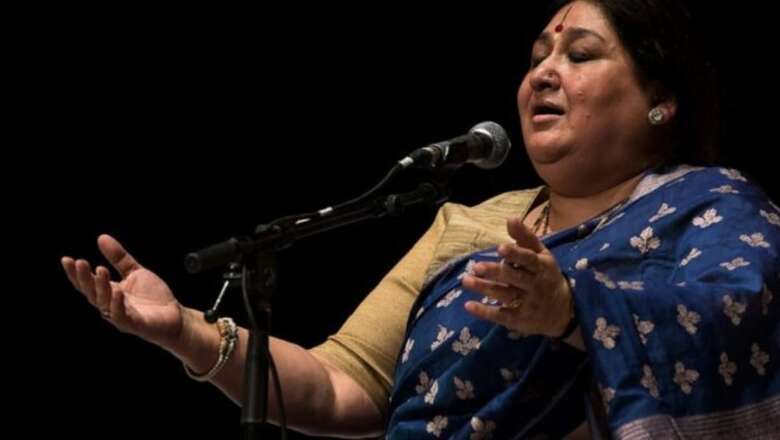
views
Shubha Mudgal’s contribution to the arena of Hindustani classical musical has been absolutely instrumental. She has been a key persona behind popularising Indian classical music oversees. However, her expertise in the genres of ‘Khyal’, ‘Thumri’ and ‘Dadra’ have not limited her from being part of several Bollywood hits. From ‘Ab Ke Sawan’ to ‘Dholna’ she has made thousands grove to her voice.
In an exclusive conversation with News18 when she was in Delhi for the launch of Seagram’s Longitude 77, Shubha Mudgal spoke about her childhood, her life and it revolving around music, favourites from the current generation and much more.
Excerpts from the interview-
How did music happen to you? Was it something you wanted to take up right since your childhood?
I was exposed to a lot of music and to learning music by my parents who were quite passionate music lovers, and they did their very best to expose my sister, my only other sibling, and me to as much music as was possible in the town that we lived in, and we were also encouraged to learn music and just feel– and there was a deep sense of love and respect for music, and that’s how I grew up in this music-loving home where there was no pressure to perform, but certainly there was a lot of encouragement to learn.
You are also a trained Kathak dancer. How did the switch from Kathak to classical music happen and do you think that your formal training in dance has also helped with your know-how and understanding of music?
It definitely has, of course. I was a little girl, four years old when I started learning dance, and I think I was more fascinated by the costumes and jewelry than the actual dance. But yes, certainly an interdisciplinary learning definitely does help you understand music a little better and know it a little better. So, I am grateful for that opportunity as well.
If one is looking through your life, one might chance upon the fact that Delhi plays an important role in your life and the music you make. Can we talk a little about that?
Delhi does play an important role because I grew up in what was then called Allahabad and is now Prayagraj, and certainly I was exposed to a lot of good music, I had very good teachers. But I was also a young person who had grown up in the town. Half the town knew me and my parents. So, I really did not know where I stood in terms of merit, and it was my mother who encouraged me to leave Allahabad and to move to another city where I would meet other students of music, try and get a better understanding of whether I really could– whether I had any merit or not, and also to see how meritorious other people were. Certainly, coming to Delhi, which is the capital, also finding the opportunity to hear a lot of different kinds of music, not just from India, but from outside India as well, because so many visiting groups come here that certainly really enriched my understanding of music. Unfortunately, now it’s also a city, which is eating up my lungs with its bad air quality.
What is your process like when it comes to music and how do you keep yourself tied to the basics even after the enormous popularity that you have attained?
Well, I think just meeting people who remember a song that you have sung or recorded 25 years ago is quite humbling, because really there is no song that I can call my own. Somebody else wrote it. Somebody else composed it. Somebody else produced it. I got to be the lucky person to sing it. And that the song is still identified with me is a humbling process, a humbling experience, and it tells you that you better not take this for granted.
Was there ever a point in time when you questioned your quest for music and rethought your plans in life?
No, I have never questioned the choice that I made. But yes, like every artist, like every other student of music, I go through ups and downs, and there are times when I feel, will I ever be able to do what I really want to do, which is not to sing in a particular big event or a big festival, but to really– what are you doing? You are actually searching for perfection– your own voice, and that is a search that is always on going and it can get depressing at times and sometimes it can be exhilarating.
People often tend to fall prey to what is popular. How do you think one can evade that stick to what they can do best?
For me, I can’t really talk about other people, but what happens to me is that when I am asked to sing something, which I am not comfortable with, I ask myself, is this what I really want to do, and if the answer is no, then I just say no, this is not something I can do, and in music also, I think there is such diversity, there are specialists in each form of music. So, really there is no need to prove that you can do it all.
Is there someone from the younger generation that you love listening to?
Many many people. In the classical field, there are several because that’s what I am most familiar with. But I guess some of you may not be familiar with those. There is Shruti Vishwakarma, there is Bhagyesh Marathe, there is Chintan Upadhyay – and the list is quite long, I could go on – Rutuja Lad; all singing classical music very beautifully. And of course, in popular music as well, there are many people who are singing beautifully and I enjoy listening to them, although I must say that I am no longer as much in touch with popular music as I used to be 10 years ago.
















Comments
0 comment